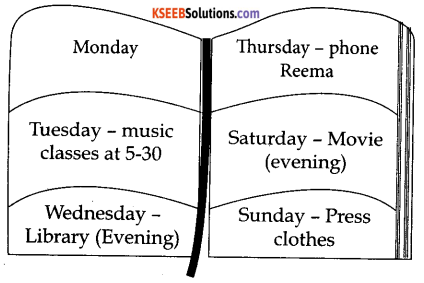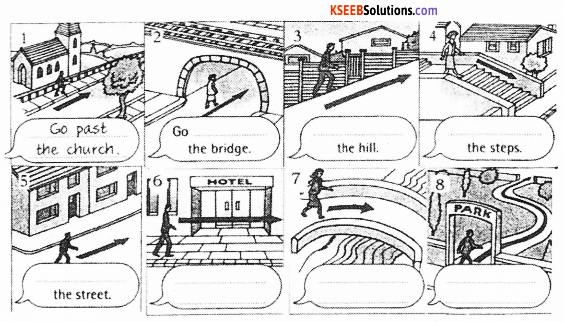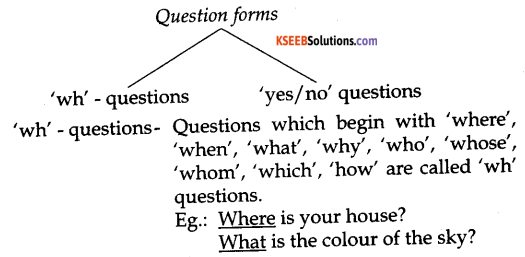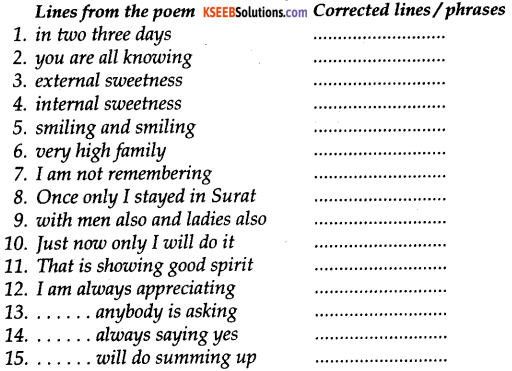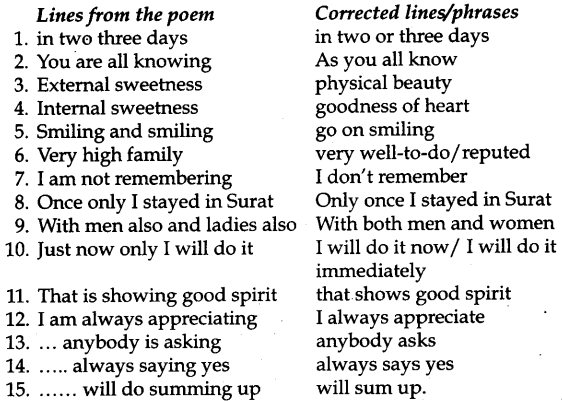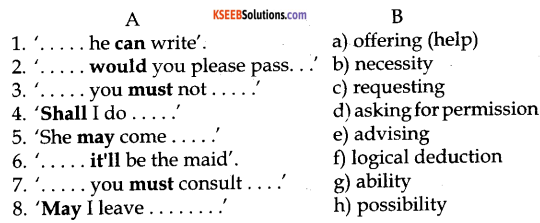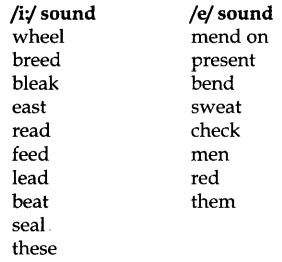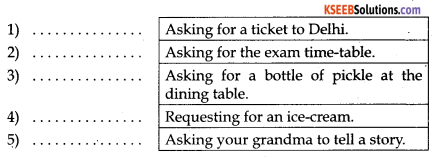By understanding the academic needs we have prepared the Karnataka State Board English Class 9 Solutions Chapter Wise. Our aim is to help the students by providing the question and answers chapter wise and help them to gain a good score in the exams. Before you start your preparation go through the chapters covered in this academic. So go through them and Download KSEEB Solutions for Class 9 English Prose Chapter 2 The Collectors Question and Answers Pdf for free.
Karnataka State Board Class 9 English Prose Chapter 2 The Collectors
The topics covered in Karnataka Secondary Education Examination Board Class 9 Solutions for English Chapter 2 The Collectors. The KSEEB Solutions Class 9 English Solutions Chapter 2 The Collectors Question and Answers are prepared according to the latest edition.The Chapterwise page will help the students to revise the syllabus during the exams.
The Collectors Questions and Answers, Summary, Notes
Comprehension:
C1. Answer the following:
Question 1.
Why was the group looking for shelter?
Answer:
The group was looking for a shelter because it suddenly started raining heavily. When they were out for an adventure walk.
Question 2.
How far was the village from the place the group was living in?
Answer:
The village was three miles from the place the group was living in.
Question 3.
Why did Mr. Hunt hesitate to seek shelter in the house?
Answer:
Mr. Hunt hesitated to take shelter in the house because it was in a lonely place and it wasn’t there the previous time he had walked there. He also felt that since all of them were dripping wet, it was not decent to go into somebody’s house.
![]()
Question 4.
Name the occupants of the house.
Answer:
The occupants of the house were Mr. and Mrs. Brown.
Question 5.
On what pretext did the occupants of the house separate the teachers from the children?
Answer:
The occupants of the house asked the children to sit in the kitchen and asked the teachers to sit in the living room. They separated them saying that there was not enough place in the living room for all to sit.
Question 6.
What seemed unnatural in the house to the children?
Answer:
The children felt that the house was very unnatural because the kitchen looked very empty. There were no plates, pots, or pans. The cupboards were empty and the fridge was also empty.
Question 7.
What was unnatural with Mrs. Brown’s hand?
Answer:
Mrs. Brown had seven fingers on both hands.
Question 8.
What did the children find in the larger cupboard?
Answer:
The children found a lot of electronic equipment in the larger cupboard. There were dials, digital read-outs, coloured lights, and a mass of other electronic equipment.
Question 9.
When Pete went to Mr. Hunt, Mr. Hunt was not moving and was staring blankly because –
a) he was thinking
b) he was drugged
c) he was meditating.
Answer:
(b) He was drugged.
![]()
Question 10.
When Pete went to Mr. Hunt, Pete heard the Browns talking to each other but could not understand what they were saying. Why?
Answer:
Pete could not understand what the Browns were talking to each other because they were not humans and were talking in an alien language.
Question 11.
Why did Pete prevent the other children from taking the drink?
Answer:
Pete prevented the other children from taking the orange juice because he suspected that it must have been drugged like the tea which his teachers had drunk.
Question 12.
Where were the aliens taking the children?
Answer:
The aliens were taking the children to their home planet.
Question 13.
Why were the aliens collecting creatures from other planets?
Answer:
The aliens were collecting creatures from other planets for experiments and scientific study.
Question 14.
Where was the control of the back door located?
Answer:
The control of the backdoor was located on the left of the panel in the large cupboard. It was marked with a yellow light.
Question 15.
After sending all the others out of the spaceship, how did Pete and Glenn manage to escape from the aliens?
Answer:
Pete ordered Mrs. and Mr. Brown to go through the door behind them and close it. He threatened to smash the equipment if they didn’t obey him. When they went out, he and Glenn escaped through the back door.
C2. Answer the following:
Question 1.
What circumstances forced the party to take shelter in the spaceship?
Answer:
The six children and their three teachers were out for an adventure walk. Suddenly it started raining heavily and as the village was three miles away, they decided to take shelter in a house they saw in the countryside. They were not aware that the house was in fact a spaceship.
Question 2.
List the things that made the children feel uncomfortable in the kitchen.
Answer:
- The kitchen is like a hospital.
- No plates, no pots, and pans.
- The cupboard is quite empty.
- The fridge is also empty.
Question 3.
Why couldn’t the children escape through either the back door or the windows?
Answer:
The children tried breaking the backdoor and the window but could not do so. They hit the door with the walking stick but it didn’t break. They realised that the glass was unbreakable. Hence they couldn’t open either the door or the window and escape. In fact, the controls for opening the door and window were in the electronic panel in the big cupboard.
![]()
Question 4.
List the following:
- Things that were in the kitchen.
- Unusual features of the Browns.
- Language used by the Browns.
- Different ways in which the children tried to get out of the house.
Answer:
- Things that were in the kitchen: An empty cupboard and a fridge that was not working.
- Unusual features of the Browns: Mrs. Brown had seven fingers on both the hands, their eyes were all one colour, they didn’t have any black-sort-of-centers.
- Language used by the Browns: Alien language, that sounded like hissing and clicking.
- Different ways children tried to get out of the house: The children tried to open the back door, tried to smash the window open with a stick. Finally, they got out by threatening Mrs. Brown.
C3. Answer the following:
Question 1.
What suspicion did the children have about the Browns and their ‘house’? What convincing reasons did Mrs. Brown come up with?
Answer:
When the children were left in the kitchen, they found it very odd that there was nothing in the kitchen no pots, pans, or plates, the cupboards were empty, the fridge was empty and disconnected.
They saw that Mrs. Brown looked very odd with seven fingers in each hand, her eyes all in one colour. They heard the Browns talking to one another in a hissing and clicking tone. The children who thought till then that the Browns were thieves, realized that they were in fact aliens. They were sure of it when they found a large mass of electronic equipment in a cupboard and the doors and windows locked and unbreakable.
When the children questioned Mrs. Brown about the empty kitchen, she said that nothing was stocked since they had just moved in. When the children asked her about the electronic panel in the cupboard, she said that her husband was a scientist and it was a part of his work. The doors and windows were burglar proof and autoclosing because they did not want their expensive equipment to be stolen.
Question 2.
How did Pete become instrumental in saving the teachers and his mates?
Answer:
Pete outsmarted the aliens. He was the first one to understand that Mrs. and Mr. Brown had drugged the teachers. He immediately grew cautious and kept the walking stick with him for possible confrontations with the Browns. He also cautioned the children not to drink the orange juice. Once the Browns came to know that they could no longer deceive the children, they let out the secret that they were aliens. They also told the children that they would be used in experiments. However, Pete’s presence of mind saved them.
He had seen the equipment being stored in the cupboard and knew that the aliens needed it badly. So he stood at the cupboard with the walking stick held high threateningly and told the aliens that if they made any wrong move, he would smash the equipment in the cupboard.
He took the help of Wayne in controlling the aliens. He asked Wayne to be ready with a chair to spoil everything in the cupboard if the aliens disobeyed his orders. He made Mr. Brown lead the teachers back to the room where the children were and dominated over Mrs. Brown to know how to open the back door.
Once all, except Wayne and he, had escaped through the back door, he ordered the aliens to go out of the other door and close it behind them. After they went out of the door, he ran out with Wayne and escaped being abducted by the aliens. Thus, Pete had the clarity of thought even in crisis and saved not only himself but also all his friends and teachers.
Additional Questions:
Question 1.
Where did Mr. Hunt keep his walking stick, once inside the house?
Answer:
He hung it on the back of a chair.
Question 2.
What drink did Mrs. Brown offer the children?
Answer:
Orange juice.
Question 3.
How did Mrs. Brown appear to the children?
Answer:
Something weird like a vampire.
Question 4.
What did the children try doing in order to get out?
Answer:
They tried to open the back door as well as the window but they were unsuccessful.
![]()
Question 5.
Why wouldn’t the police be able to find them?
Answer:
The aliens planned to leave the place along with the teachers and the children. Once their spaceship left, there would be no trace left. So, the police would not be able to find them.
Question 6.
How did Pete keep Mr. and Mrs. Brown away?
Answer:
By threatening to smash their electronic equipment if they moved nearer.
Question 7.
Why was Mrs. Brown afraid of attacking the children?
Answer:
She did not want to be stranded on Earth. If any part of their equipment broke, they had no chance of repairing it.
Question 8.
Where was the house after all of them got out?
Answer:
It had vanished in a soundless flash.
Question 9.
Where did the teachers and children go after their strange experience?
Answer:
Towards the village.
Multiple Choice Questions:
Question 1.
In the play ‘The Collectors’, a group of teachers and children went out for
A) a picnic
B) an excursion
C) a visit to a historical place
D) an adventure walk.
Answer:
D) an adventure walk.
Question 2.
The group decided to take shelter in a lonely house because
A) it was raining hard
B) they were tired of walking
C) they were hungry
D) it was dark.
Answer:
A) it was raining hard
![]()
Question 3.
The children found the kitchen unusual because there were
A) no pots, pans or plates
B) no windows
C) no cupboards
D) no vegetables
Answer:
A) no pots, pans or plates
Question 4.
The group did not want to go to the village because
A) they did not want to walk nearly three miles in the rain
B) the Browns invited them to their house
C) Mr. Hunt knew the Browns
D) it was night already.
Answer:
A) they did not want to walk nearly three miles in the rain
Question 5.
Mrs. Brown warned the children
A) not to touch the cupboards
B) not to play in the kitchen
C) not to go out
D) not to open the fridge.
Answer:
A) not to touch the cupboards
Question 6.
Pete went into the sitting room to talk to Mr. Hunt. But he found Mr. Hunt
A) sleeping soundly
B) staring blankly at nothing
C) talking to the other teachers
D) talking to the Browns
Answer:
B) staring blankly at nothing
Question 7.
Mrs. Brown said that the back door and the windows were locked because
A) Mr. Brown did not want his equipment stolen.
B) they did not want anybody to come in.
C) they did not want to be seen by anyone.
D) they were hiding from the police.
Answer:
A) Mr. Brown did not want his equipment stolen.
![]()
Question 8.
The kitchen reminded Pete of a
A) school
B) theatre
C) hospital
D) laboratory
Answer:
C) hospital
Language Activities:
A. Vocabulary:
V1. a) Look at the following describing words and phrases. Group them under words or phrases describing the place and describing the Browns. Write two different paragraphs describing the place and describing the Browns.
Terribly quiet, aliens, had seven fingers, eyes had no centre, weird, weird like a vampire, cold, strange, spoke strange language, deserted, empty.
Words describing the place Words describing the Browns

Answer:
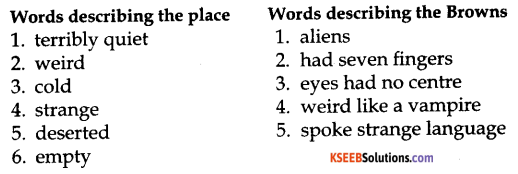
Paragraphs:
- The place was terribly quiet. It was cold inside and appeared strange. It was in a totally deserted place. Every cupboard in the kitchen was empty and it all felt weird.
- Mr. and Mrs. Brown were aliens. They spoke a strange language. Their eyes did not have any black centres. Mrs. Brown had seven fingers on each of her hands and the children felt that she was weird like a vampire.
b) Synonyms of the word ‘wet’.
drenched, dripping, drizzling, foggy, humid, misty, soaked, sodden.
Write the meaning of each word, and see how they differ in their meaning. Write a sentence each for every word.
- drenched: To make someone or something completely wet. As he was completely drenched, he decided to skip classes.
- dripping: make something fall in drips.
Since she did not dry her hair, water was dripping from her plait. - drizzling: light rain.
Since it is drizzling, the match has to be cancelled. - foggy: a thick cloud of very small drops of water in the air close to the land.
Mr. Bhat couldn’t reach the airport in time as the traffic was moving slowly owing to fog. - humid: containing extremely small drops of water in the air.
Since our city is humid during summer, tourists find the stay uncomfortable. - misty: full of or covered with mist.
The misty weather added an aura of mystery to the lonely place. - soaked: completely wet.
The maid soaked the clothes in hot water to remove the stains. - sodden: extremely wet.
Since his footwear was sodden, he couldn’t run fast.
V2. a) Prefix:
Prefix is an ‘addition’ to the ‘beginning’ of a word which changes its form and meaning. Below are some examples of prefixes. You add some more (at least three each) to them.
| Prefix | Meaning | Example | More examples |
| bi- | two, twice | bicycle | |
| CO – | together, with | co-operate | |
| multi – | many | multipurpose | |
| mono – pre – | single before |
monosyllable pre-school |
|
| re – | again | rewrite | |
| post – | after, later | postpone | |
| il-, im-, in-, ir-, non-, un-, mis-, dis- | not (antonyms of the words) | illiterate, impossible, inactive, irresponsible, nonviolence, unlock | |
| over – | too much | overeat | |
| semi – | half | semicircle | |
| under – | not enough | underweight |
More examples:
- bi – bifocal; biannual; bicycle; biweekly.
- co – co-ordinate; co-curriculum; co-passenger; co-existence; co-education; co-habitation; co-incidence; co-worker.
- multi – multi-functional; multi-faceted; multi-media; multi-coloured; multi-lingual; multi-national.
- mono – monograph; monotone; monolith; monopoly; monorail.
- pre – pre-determine; pre-arrange; preface; pre-cast; preview; prefix.
- re – regain; redo; return; reunite; rediscover; react; reassure; rebound; recall; recap.
- post – post-operation; post-natal; post-script; post-mortem; post-war; post-graduate.
- il – illegitimate; illegal; illness; illiterate; illogical.
- im – imperfect; imbalance; impossible; immeasurable.
- in- inability; incomplete; inaccurate; indefinite; incorrect; inevitable; inappropriate.
- ir – irregular; irrational; irrecoverable; irredeemable; irrelevant; irresponsible.
- non- non-cooperation; non-existent; non-entity; non-interference; nonsense; non-stick.
- un- uneventful; undone; unwanted; unfinished; unknown; unlike; unquestionable; unreasonable.
- mis – misconduct; mislead; mismanage; misunderstand; misuse; misfire; mistake.
- dis – disqualify; dislocate; displease; disappear; disgrace; dislike; disagree; disorder.
- over- overreact; overconfident; overjoyed; overwork; overdue; overeat; overdo.
- semi – semi-conductor; semi-conscious; semi-final; semi-circle.
- under – underage; undergraduate; underestimate; underprivileged; underline; underweight.
b) Suffix:
Suffix is an addition to the end of a word which changes its form and meaning. Suffixes are mainly used to make nouns, adjectives, adverbs, antonyms and verbs.
1. The table shows some examples for the same. You add some more in the last column.
| Suffix | Examples |
More examples |
| -er, -or, -ist, -ee | teacher, editor, tourist, employee | |
| -ance, -ence, -ism, -dom, -ity, -ty, -ship | performance, existence, patriotism, kingdom, possibility, cruelty, hardship | |
| -al, -en, -ful, -ly, -less, -ous | national, golden, joyful, friendly, fearless, nervous | |
| -en, -ise (or) -ize | broaden, nationalise, modernize | |
| -ly | quickly, boldly |
More Examples:
- -er – preacher, examiner, prayer, cheater, reader.
- -or – monitor, evaluator, sailor, conqueror.
- -ist – motorist, guitarist, dentist.
- -ee – payee, interviewee, addressee, employee.
- -ance – accordance, attendance, tolerance.
- -ence – preference, difference, existence.
- -ism – tourism, absenteeism, criticism.
- -dom – freedom, boredom, martyrdom.
- -ity – probability, morality, capability, density.
- -ty – nutty, potty, dotty, fatty.
- -ship – kinship, statesmanship, friendship.
- -al – emotional, seasonal, arrival, optional.
- -en – broken, spoken, shaken.
- -ful – playful, painful, careful, helpful.
- -ly – quietly, mostly, lastly.
- -less – jobless, cashless, pointless.
- -ous – joyous, adventurous, disastrous, poisonous.
- -en – lengthen, strengthen, soften, shorten.
- -ise or -ize – internalise, patronise, centralise, characterise.
- -ly – sharply, narrowly, primarily.
![]()
2. Form new words using the appropriate prefixes or suffixes:
Example: safe – unsafe, safely, safety.
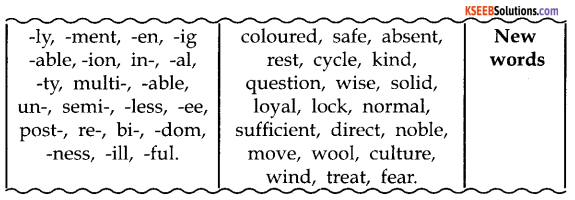
New words:
- Coloured – colourful, colourless, colourfully, discolour.
- Absent – absence, absentminded, absenteeism, absentee.
- Rest – restful, restless, restive, resting, unrest.
- Cycle – cyclic, cyclical, cyclist, bicycle.
- Kind – kindly, kindness, unkind, unkindly.
- Question – questionable, questionably, questioning, questionnaire, unquestionable.
- Wise – wisely, wisdom, unwise, unwisely.
- Solid – solidify, solidly, solidity, solidness.
- Loyal – loyally, loyalty, disloyal, disloyally.
- Lock – unlock, locker, locking, locked.
- Normal – normally, normalcy, normality, abnormal, abnormally.
- Sufficient – suffice, insufficient, sufficiently, sufficiency.
- Direct – direction, director, directly, directionless.
- Noble – nobility, ignoble, nobly, nobleness.
- Move – movable, movably, immovable, moving, movement, mover, remove, remover, removable, removability, unmoved, moved.
- Wool – woolly, woollen.
- Culture – culturally, cultural, cultureless, uncultured, cultured.
- Wind – windy, windless, unwind, winding, windmill, windfall, winded.
- Treat – treatment, treaty, entreat.
- Fear – fearless, fearful, fearlessly, fearfully, fearsome.
B. Grammar And Usage:
I. First conditionals (possible)
G1. Match the following Main clauses and ‘if’ clauses:
| ‘If’ clause | Main clause |
| 1. If you wastewater 2. If you lend me some money 3. If Ravi is late 4. If the bus breaks down 5. If it rains |
a. he will be punished b. I won’t be able to attend the class c. I shall get wet d. I can buy a new car e. you will suffer |
Answer:
- e
- d
- a
- b
- c
II. Second conditionals (probable):
G2. A. Use the words provided and rewrite the sentences using ‘if’ clauses:
- Tajmahal/Chaya/Agra/visit
If Chaya had visited Agra, she would have visited Tajmahal. - rained/the plants/not wither
If it rained, the plants wouldn’t wither. - had/P ay alan/new shoes/jog faster
If Payalan had new shoes, he would jog faster. - had/Kalai/a cycle/reach school earlier.
If Kalai had a cycle, he would reach school earlier.
B. Match the phrases in Column A with those in Column B:
| A | B |
| If he studied well | a) I would buy a BMW car |
| If he went late | b) he would pass the exam |
| If I won a lottery | c) the dog would bite us |
| If it got out of the gate | d) he would not get water |
| If I had more money | e) I would feed a lot of people |
Answer:
- b
- d
- a
- c
- e
III. Third conditionals:
G3. Exercise:
Complete the following sentences with suitable clauses given in the box below:
- If Raj had got enough water, ……………..
- Prajwal would have found a job, ………………
- If Ramya hadn’t started early, ………………
- Christopher would have got a prize, ……………….
- If we had saved more rain water in ponds and lakes, …………………

Answer:
- If Raj had got enough water, he would have shared it with his neighbour.
- Prajwal would have found a job, if he had attended the interview.
- If Ramya hadn’t started early, she would have been late to work.
- Christopher would have got a prize, if he had performed . well.
- If we had saved more rain water in ponds and lakes, we could have survived the drought.
Listening And Speaking:
L2. What/ how would you suggest in the following situations?
- Your friend’s eyes are red and watering, (……………. go to a doctor)
- Your neighbour is suffering from toothache. ( ………….. I would go to the dentist.)
- Ramesh wants to improve his English. ( ……………….. join a crash course)
- The local MLA wants to meet your H.M. but the H.M. is away for a meeting. (……………… come tomorrow)
- Salim wants to buy a dictionary but has no money. (……………… borrow from the library.)
Answer:
- Your friend’s eyes are red and watering. Why don’t you go to the doctor?
- Your neighbour is suffering from toothache. If I were you, I would go to the dentist.
- Ramesh wants to improve his English. I think you should join a crash course.
- Local MLA wants to meet your H.M., but the H.M. is away for a meeting. Excuse me, sir, I am afraid you will have to come tomorrow.
- Salim wants to buy a dictionary but has no money. How about borrowing one from the library?
The Collectors Summary in English
‘The Collectors’ is a one-act play about the encounter of a group of teachers and children on an adventure walk in a lonely countryside with two aliens. The aliens have taken the form of humans and hence the group takes shelter in their spaceship mistaking it for a house.
It’s raining heavily and Miss Swann wonders whether they could get shelter. But Mr. Hunt replies that they could get a shelter only after reaching the village which is three miles away. It is at this point that the group sees a house. The strangeness of the house is apparent right from the beginning.
Mrs. Jones says that it is funny-looking. Mr. Hunt remarks that it wasn’t there when he had been there the previous summer. However, since the children are wet and cold, they decide to approach the house for shelter. They also think that if it is embarrassing to ask for shelter for so many of them, they would take shelter in the shed.
However, they are welcomed by the inmates of the house, Mrs. and Mr. Brown. The grown-ups are taken to the sitting room and they are also offered tea. But after the three teachers and the inmates of the house have gone to the sitting room, the children start feeling uncomfortable. They find the house to be strange as it is terribly quiet and cold, and there is no wind at all. They also find everything empty as though the house is not being used at all. The children wonder whether the Browns have put all their things in the cupboard.
But when they look into the cupboard, they find the cupboard empty. The fridge is not only empty but it is not switched on also. Even as Dawn and Tracy warn Wayne and Pete not to snoop around, Carol remarks that she finds the Browns strange. The children come to the conclusion that the Browns are crooks and the house is their hideout.
At this point, Mrs. Brown comes back and she finds the cupboard open. She warns the children not to mess around. She also offers the explanation that they are yet to open the packs and put things in their place as they had just moved into the new place. She even offers orange juice to the children and leaves the room, warning the children once again not to touch the cupboards.
However, the suspicion of the children grows. They even notice that she has seven fingers each on her two hands. They also find her eyes strange as they don’t seem to have the pupil. The children feel that it is better for them to leave the place and hence Pete goes to meet the teachers.
Wayne meanwhile grows curious about the second cupboard. Though Dawn and Tracy warn Wayne not to touch the cupboard, Wayne opens the cupboard and the children are surprised to see dials, digital read¬outs, coloured lights and electronic equipment in the cupboard.
At that point Pete returns and increases the discomfort of the children by sharing with them his doubt that the teachers were drugged. He reveals that the three teachers had sat motionless and the Browns were communicating with each other in a strange way, hissing and clicking at each other. The children, who are by now more and more uncomfortable, decide to get out of the house.
But Wayne finds the back door locked and there is no key. The same is true of the window also. They are not able to break it open with Mr. Hunt’s stick as the glass is like steel. Even as they decide to look for a way out through the front, Mrs. Brown returns with a tray of drinks. The children confront her directly and ask her what she has done to their teachers. She refutes the allegation that they have drugged the teachers.
When the children ask her about the strange things in the cupboard, she tells them that Mr. Brown is a scientist and it is his electronic equipment. She gives the explanation that the door and the window are burglar-proof. At this point Tracy blurts out that the children have found the house and the inmates to be strange.
Even as Mrs. Brown takes offence, Pete confronts her and asks her to take them to the sitting room. Mrs. Brown, in response, offers to get one of their teachers to where they are. Once again Tracy and Dawn believe Mrs. Brown and start blaming Pete for unnecessarily scaring them.
But Mrs. Brown returns with Mr. Brown instead of Mr. Hunt and Mr. Brown orders the. children to drink the juice. They refuse to do so, prompted by Pete. When Glen and Wayne try to escape, they are sent flying across the kitchen by Mrs. Brown. The children learn the truth one by one. When the children tell Mr. Brown that they cannot be kidnapped as the police would look for them, Mr. Brown tells them that they are aliens who have taken the human shape and the shelter that looked like a house would be converted to a spaceship when they are ready to take off.
He adds that the children can’t anyway escape and if they were to drink the juice, it would lessen the shock of the take-off of the spaceship. He also lets out the secret that children are collected for the sake of experiments and scientific study.
But just then the presence of mind of Pete saves the children and their teachers. He had seen the equipment being stored in the cupboard and knew that the aliens needed it badly. So he stands at the cupboard with the walking stick held high threateningly and tells the aliens that if they made any wrong move, he would smash the equipment in the cupboard. He takes the help of Wayne in controlling the aliens.
He asks Wayne to be ready with a chair to destroy everything in the cupboard if the aliens disobey his orders. He makes Mr. Brown lead the teachers to the room where the children are and dominates over Mrs. Brown and learns how to open the back door.
Once all, except Wayne and he, have escaped through the back door, he orders the aliens to go out of the other door and closes it behind them. After they go out of the door, he runs out with Wayne and escapes being abducted by the aliens. Thus, Pete has clarity of thought even in crisis and saves not only himself but also all his friends and teachers.
After a while the group is surprised to realise that it is neither raining nor foggy and the sun is out. The house itself is not there. It is as if they had imagined their encounter with the aliens. There is a difference of opinion about reporting the matter. Some like Tracy feel that nobody would believe them.
Some like Mr. Hunt feel that the matter should be reported especially since people have disappeared. He feels that there should be a warning. The play comes to an end even as the group continues to argue over the matter.
Glossary:
porch: covered entrance, portico
weird: strange, unusual
cheeky: disrespectful
snoop: poke around
stranded: trapped
anoraks: a waterproof jacket, typically with a hood, of a kind originally used in polar regions
potty: foolish, silly.
We hope the information prevailed in this article is helpful for all the students of Class 9. The Karnataka State Board Solutions for Class 9 English Chapter 2 The Collectors Question and Answers pdf enhance your skills and score good marks in the exams. Stay tuned to get the latest information about the KSEEB Solutions Class 9 English Solutions.
